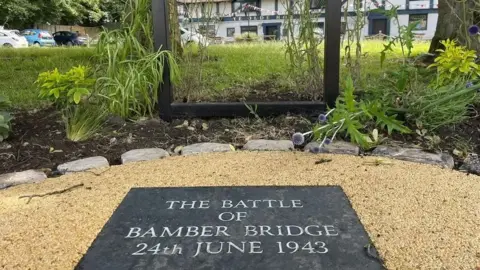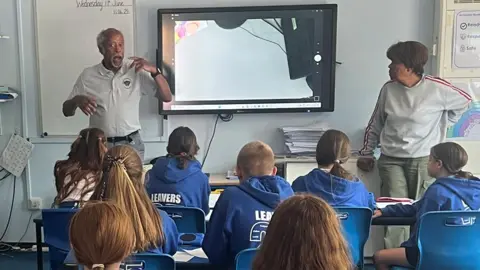WW2 shooting of black US soldier taught in school
 BBC
BBCThe fatal shooting of a black US soldier when trouble escalated between US troops stationed in Lancashire during World War Two has become a "cornerstone" lesson to local primary school children.
Pte William Crossland was shot dead on 24 June 1943 during racial violence between US troops stationed in Bamber Bridge, Preston.
The story of troops on the same side fighting a gun battle on the street is known as the Battle of Bamber Bridge and is now being taught at Clayton Brook Primary School.
"It's messages are still relevant today," head teacher Paul Farina said.

Trouble had begun when white US military police officers tried to arrest a black soldier, Pte Eugene Nunn, in Ye Olde Hob Inn for wearing the wrong uniform.
Locals had sided with the soldier and his group, saying they had done nothing wrong, they were welcome in the pub, and they did not approve of racial segregation at the base. Events then escalated into a gun battle on the street and also back at the base.
The fight resulted in several injuries on both sides and the death of Pte Crossland.
Mr Farina said after learning about the story, he contacted Clinton Smith of Preston Black History Group "and that's where the ball started rolling".
"We now teach it to all of our children, it's one of the cornerstones of what we teach at Clayton Brook," he said.
Mr Smith said: "I think the world's full of bad news and here's a story about solidarity."
The US military had tried to enforce their segregation rules in the UK but he said the stance the people of Bamber Bridge took against it "was remarkable".
"Bearing in mind this was a small, northern village and, as far as we can work out, it was a spontaneous act," he said.
"I didn't like going to school, but now I turn up with a smile on my face and excitement coursing through my veins," he said.
"What's really rewarding about it is the interaction with the youngsters and the knowledge that they have that's feeding back to me.
"The reception I get is the encouragement I use to carry on doing it."
Listen to the best of BBC Radio Lancashire on BBC Sounds and follow BBC Lancashire on Facebook, X and Instagram and watch BBC North West Tonight on BBC iPlayer.
